Related Research Articles

Boryslav is a city located on the Tysmenytsia, in Drohobych Raion, Lviv Oblast (region) of western Ukraine. It hosts the administration of Boryslav urban hromada, one of the hromadas of Ukraine. Boryslav is a major center of the petroleum and ozokerite industries. Population: 32,473.

Lucy Dawidowicz was an American historian and writer. She wrote books about modern Jewish history, in particular, about the Holocaust.
The Białystok Ghetto uprising was an insurrection in the Jewish Białystok Ghetto against the Nazi German occupation authorities during World War II. The uprising was launched on the night of August 16, 1943 and was the second-largest ghetto uprising organized in Nazi-occupied Poland after the Warsaw Ghetto Uprising of April–May 1943. It was led by the Anti-Fascist Military Organisation, a branch of the Warsaw Anti-Fascist Bloc.

The Ringelblum Archive is a collection of documents from the World War II Warsaw Ghetto, collected and preserved by a group known by the codename Oyneg Shabbos, led by Jewish historian Emanuel Ringelblum. The group, which included historians, writers, rabbis, and social workers, was dedicated to chronicling life in the Ghetto during the German occupation. They worked as a team, collecting documents and soliciting testimonies and reports from dozens of volunteers of all ages. The materials submitted included essays, diaries, drawings, wall posters, and other materials describing life in the Ghetto. The archive assembly began in September 1939 and ended in January 1943; the material was buried in the ghetto in three caches.

Slavuta is a city in Shepetivka Raion, Khmelnytskyi Oblast (province) of western Ukraine, located on the Horyn River. The city is located approximately 80 km from the oblast capital, Khmelnytskyi, at around 50°18′N26°52′E. Slavuta hosts the administration of Slavuta urban hromada, one of the hromadas of Ukraine. Population: 34,918.

Saul Friedländer is a Czech-born Jewish historian and a professor emeritus of history at UCLA.
Harry Elmer Barnes was an American historian who, in his later years, was known for his historical revisionism and Holocaust denial.
Filip (Philip) Friedman was a Polish-Jewish historian and the author of several books on history and economics.

The Holocaust in Ukraine was the systematic mass murder of Jews in the Reichskommissariat Ukraine, the General Government, the Crimean General Government and some areas which were located to the East of Reichskommissariat Ukraine, in the Transnistria Governorate and Bessarabia, Northern Bukovina and the Hertsa region and Carpathian Ruthenia during World War II. The listed areas are currently parts of Ukraine.

Marģers Vestermanis is a Latvian Holocaust survivor, historian, founder and former director of the museum Jews in Latvia.
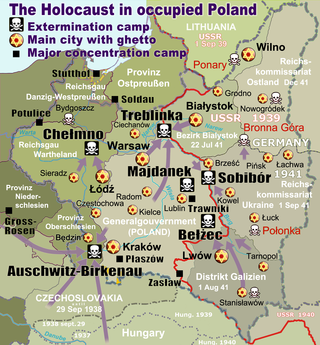
Sambor Ghetto was a Nazi ghetto established in March 1942 by the SS in Sambir, Western Ukraine. In the interwar period, the town (Sambor) had been part of the Second Polish Republic. In 1941, the Germans captured the town at the beginning of Operation Barbarossa. According to the Polish census of 1931, Jews constituted nearly 29 percent of the town's inhabitants, most of whom were murdered during the Holocaust. Sambor (Sambir) is not to be confused with the much smaller Old Sambor located nearby, although the Jewish history of the two is inextricably linked.
Geoffrey P. Megargee was an American historian and author who specialized in World War II military history and the history of the Holocaust. He served as the project director and editor-in-chief for the Encyclopedia of Camps and Ghettos, 1933–1945 produced by the United States Holocaust Memorial Museum. Megargee's work on the German High Command won the 2001 Distinguished Book Award from the Society for Military History.
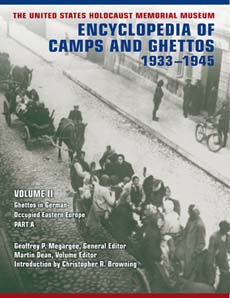
Encyclopedia of Camps and Ghettos, 1933–1945 is a seven-part encyclopedia series that explores the history of the concentration camps, ghettos, forced-labor camps, and other sites of detention, persecution, or state-sponsored murder run by Nazi Germany and other Axis powers in Europe and Africa. The series is produced by the United States Holocaust Memorial Museum (USHMM) and published by Indiana University Press. Research began in 2000; the first volume was published in 2009; and the final volume is slated for publication in 2025. Along with entries on individual sites, the encyclopedias also contain scholarly overviews for historical context.

Roman Markovich Shvartsman is chairman of the Odesa regional Association of Jews – former prisoners of ghetto and Nazi concentration camps.

Museum of the Holocaust – victims of fascism, Odesa – the first Museum in Ukraine, which is based on the events of the genocide of the Jewish population in Transnistria Governorate.
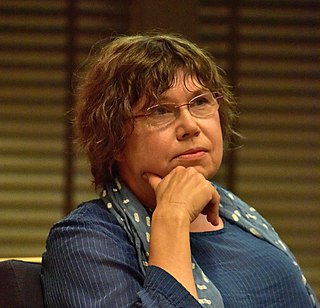
Barbara Engelking is a Polish psychologist and sociologist specializing in Holocaust studies. The founder and director of the Polish Center for Holocaust Research in Warsaw, she is the author or editor of several works on the Holocaust in Poland.
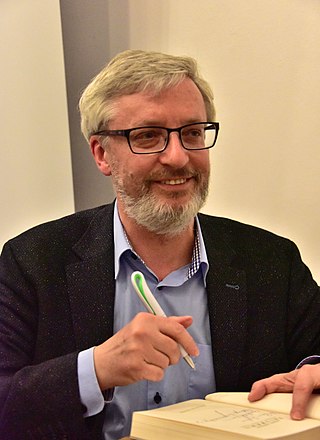
Jacek Leociak is a Polish literary scholar and historian as well as author. He is a professor of humanities and an employee of the Institute of Literary Research at the Polish Academy of Sciences and the Polish Center for Holocaust Research in Warsaw.
The Battle of Lwów was a World War II battle for the control over the city of Lwów between the Red Army and the invading Wehrmacht and the Organisation of Ukrainian Nationalists.
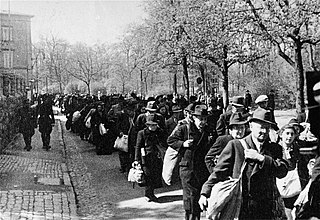
The question of how much Germans knew about the Holocaust whilst it was being executed is a matter of debate by historians. In Nazi Germany, it was an open secret among the population by 1943, Peter Longerich argues, but some authors place it even earlier. After the war, many Germans claimed that they were ignorant of the crimes perpetrated by the Nazi regime, a claim associated with the stereotypical phrase "Davon haben wir nichts gewusst".
Nina Antonivna Karavanska was a Ukrainian dissident, Soviet microbiologist and immunologist. She was a member of the dissident movement in the USSR, a co-founder of the Ukrainian Helsinki Group and one of the leading human rights activists in Odesa during the Soviet period. She is the author of about 23 scientific papers in the field of clinical microbiology and immunology. She spoke Russian, Ukrainian, English, German, Polish, and Romanian. She was the wife of Sviatoslav Karavansky.
References
- ↑ "Die sowjetischen Kriegsgefangenen". www.buerger-engagement-fuer-ns-zwangsarbeiter.de. Archived from the original on 21 July 2012. Retrieved 22 May 2022.